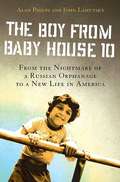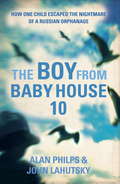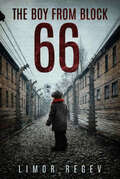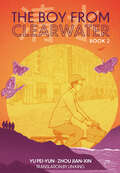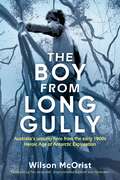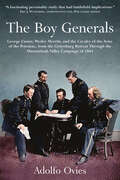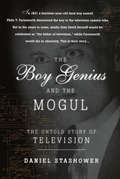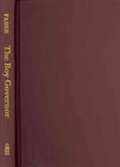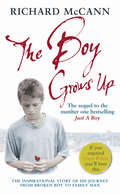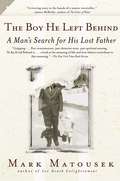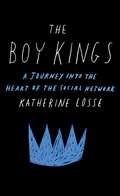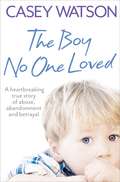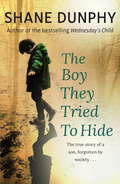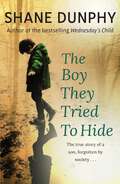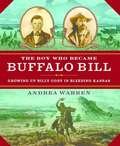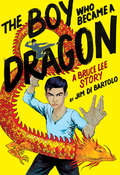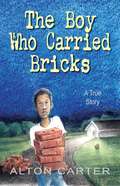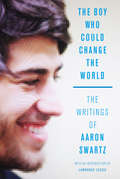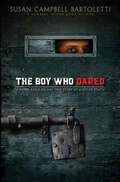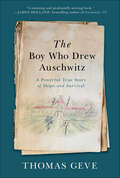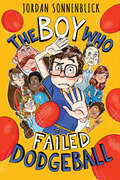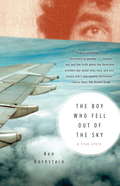- Table View
- List View
The Boy From Baby House 10: From the Nightmare of a Russian Orphanage to a New Life in America
by Alan Philps John LahutskyIn 1990, a young boy afflicted with cerebral palsy was born, prematurely, in Russia. His name was Vanya. His mother abandoned him to the state childcare system and he was sent to a bleak orphanage called Baby House 10. Once there, he entered a nightmare world he was not to leave for more than eight years. Housed in a ward with a group of other children, he was clothed in rags, ignored by most of the staff and given little, if any, medical treatment. He was finally, and cruelly, confined for a time to a mental asylum where he lived, almost caged, lying in a pool of his own waste on a locked ward surrounded by psychotic adults. But, that didn't stop Vanya. Even in these harsh conditions, he grew into a smart and persistent young boy who reached out to everyone around him. Two of those he reached out to-Sarah Philps, the wife of a British journalist, and Vika, a young Russian woman-realized that Vanya was no ordinary child and they began a campaign to find him a home. After many twists and turns, Vanya came to the attention of a single woman living in the United States named Paula Lahutsky. After a lot of red tape and more than one miracle, Paula adopted Vanya and brought him to the U. S. where he is now known as John Lahutsky, an honors student at Freedom High School in Bethlehem, Pennsylvania and a member of the Boy Scouts of America Order of the Arrow. In The Boy From Baby House 10, Sarah's husband, Alan Philps, helps John Lahutsky bring this inspiring true-life story of a small boy with a big heart and an unquenchable will to readers everywhere.
The Boy From Baby House 10: How One Child Escaped the Nightmare of a Russian Orphanage
by Alan Philps John LahutskyGripping expose revealing one of the last secrets of the Soviet empire: its abuse of children in state institutions.This is the affecting true story of a remarkable young boy named John Lahutsky. John, born in Russia in 1990, was afflicted with cerebral palsy, abandoned by his birth mother and consigned to certain death in the deplorable orphanages and asylums of Russia. He was discovered, living half naked and confined in an iron-barred cot for 24 hours a day. But he refused to succumb to the regime of abuse, and enlisted a range of people to help him escape. For three years he was under constant threat of being returned to an asylum but, after a series of miraculous coincidences and terrible disappointments, he moved to America. He has been able to start a new life and, now aged eighteen, is a full partner in this book, with his memories supplemented by outsiders who battled the system on his behalf. Life in these appalling institutions has remained a closely guarded secret. But the author has managed to gain unprecedented access and has uncovered a true portrait of a child-care system which was founded by Stalin but exists to this day.
The Boy From Block 66 (Heroic Children of World War II)
by Limor RegevJanuary, 1945. 14-year-old Moshe Kessler steps off the train at Buchenwald concentration camp. Having endured the horrors of Auschwitz-Birkenau, lost touch with his entire family, and survived the death march in the freezing European winter, he has seen more than his share of tragedy. Moshe knows only one thing about Buchenwald. Everyone knows it. If you want to survive, you have to get to Block 66. The Germans are cruel and determined – but they are not prepared for Buchenwald’s secret resistance, which rises up with one mission only: to protect the camp’s children from harm. This is the incredible true story of Moshe Kessler and Block 66 – the children’s block that was at the forefront of one of the most shocking and inspiring stories of Holocaust survival.
The Boy From Clearwater: Book 2
by Pei-Yun YuThe "glorious" sequel to Freeman Award-winning The Boy from Clearwater After his imprisonment in Green Island, Kun-lin struggles to pick up where he left off ten years earlier. He reconnects with his childhood crush Kimiko and finds work as an editor, jumping from publisher to publisher until finally settling at an advertising company. But when manhua publishing becomes victim to censorship, and many of his friends lose their jobs, Kun-lin takes matters into his own hands. He starts a children’s magazine, Prince, for a group of unemployed artists and his old inmates who cannot find work anywhere else. Kun-lin’s life finally seems to be looking up... but how long will this last? Forty years later, Kun-lin serves as a volunteer at the White Terror Memorial Park, promoting human rights education. There, he meets Yu Pei-Yun, a young college professor who provides him with an opportunity to reminisce on his past and how he picked himself up after grappling with bankruptcy and depression. With the end of martial law, Kun-lin and other former New-Lifers felt compelled to mobilize to rehabilitate fellow White Terror victims, forcing him to face his past head-on. While navigating his changing homeland, he must conciliate all parts of himself––the victim and the savior, the patriot and the rebel, a father to the future generation and a son to the old Taiwan––before he can bury the ghosts of his past. P R A I S E ★ "Yu, Zhou, and King bear glorious witness to little-known tragic history by empathetically spotlighting an everyday superhero who survived—and thrives." –Booklist (starred) ★ "An accessible, timely account of Taiwan’s struggles for democracy and human rights as experienced through a personal lens." –Kirkus (starred) "Triumphant and rewarding." –Foreword
The Boy From Long Gully: Australia's unsung hero from the early 1900s Heroic Age of Antarctic Exploration
by Wilson McOristIn 1914, Richard Richards abandons his comfortable life as a science teacher in Australia, to join a support party for Ernest Shackleton, in a very unfamiliar place; the Antarctic. Due to unforeseen circumstances Richards and a number of his companions become stranded in the Antarctic. However, despite his comparative youth, and inexperience in polar conditions, Richards adapts and survives, unlike some of his companions. He becomes more than an integral member of the team; he takes over a leadership role. He demonstrates what humans can do to stay alive, against near-impossible odds. The Boy from Long Gully provides the reader with a thrilling insight into the mind-blowing and harrowing ordeal of twenty-two-year-old Richards. It is an utterly riveting story, one of the most amazing tales from a bygone era; the so-called Heroic Age in the Antarctic. Richard Richards is awarded the Albert Medal in 1923, for his heroism and gallantry in saving life in the Antarctic, the only Australian ever to be so honoured. However, with the Australian public today he is almost unknown. He is an unsung hero, but he ranks alongside Douglas Mawson in any yardstick of famous Australians from the early 1900s &‘Heroic Age of Antarctic Exploration&’.
The Boy Generals: From the Gettysburg Retreat Through the Shenandoah Valley Campaign of 1864
by Adolfo Ovies“Al Ovies combines an impressive array of source material and intricate analysis to craft a historical gem. This is a must-read for anyone interested in Civil War cavalry and later war actions in the Eastern Theater.” — Scott Patchan, author of The Last Battle of Winchester The second installment of Al Ovies’ The Boy Generals trilogy, George Custer, Wesley Merritt and the Cavalry of the Army of the Potomac, from the Gettysburg Retreat through the Shenandoah Valley Campaign of 1864, encompasses a period jammed with tumultuous events for the cavalry on and off the battlefield and a significant change of command at the top. Once below the Potomac River, the Union troopers raced down the east side of the Blue Ridge Mountains but were unable to prevent General Lee’s wounded Army of Northern Virginia from reaching Culpeper. The balance of the 1863 was a series of maneuvers, raids, and fighting that witnessed the near-destruction of the Michigan Cavalry Brigade at Buckland Mills and the indecisive and frustrating efforts of the Bristoe Station and Mine Run campaigns. Alfred Pleasonton’s controversial command of the mounted arm ended abruptly, only to be replaced by the more controversial Philip H. Sheridan, whose combustible personality intensified the animosity burning between George Custer and Wesley Merritt. Victory and glory followed the Cavalry Corps during the early days of Overland campaign, particularly at Yellow Tavern, where Rebel cavalier Jeb Stuart was mortally wounded. The “spirited rivalry” between Custer and Merritt, in turn, took a turn for the worse. At Trevilian Station, the bitterness and rancor permeating their relationship broke into the open to include harsh official reports critical of the other’s actions. Merritt’s elevation to temporary command of the 1st Cavalry Division cemented their rancor. Just as their relationship worsened, so too did the tenor of the war darken as the sieges of Richmond and Petersburg ground on, and Confederate partisan Col. John S. Mosby intensified guerrilla operations that disrupted Union logistics in the Shenandoah Valley. When Gen. Ulysses Grant demanded that Sheridan escalate retribution, the cavalry commander delivered his infamous edict to “eat out Virginia clear and clean as far as they go, so that crows flying over it for the balance of the season will have to carry their provender with them.” Much of the gritty task fell on the shoulders of the boy generals. Adolfo Ovies’ well-researched and meticulously detailed account of the increasingly dysfunctional relationship between Custer and Merritt follows the same entertaining style in the first installment. The Boy Generals changes the way Civil War enthusiasts will understand and judge the actions of the Union’s bold riders.
The Boy Genius and the Mogul: The Untold Story of Television
by Daniel StashowerThe world remembers Edison, Ford, and the Wright Brothers. But what about Philo T. Farnsworth, the inventor of television, an innovation that did as much as any other to shape the twentieth century? That question lies at the heart ofThe Boy Genius and the Mogul, Daniel Stashower's captivating chronicle of television's true inventor, the battle he faced to capitalize on his breakthrough, and the powerful forces that resulted in the collapse of his dreams. The son of a Mormon farmer, Farnsworth was bor...
The Boy Governor: Stevens T. Mason and the Birth of Michigan Politics
by Don FaberIn 1831, Stevens T. Mason was named Secretary of the Michigan Territory at the tender age of 19, two years before he could even vote. The youngest presidential appointee in American history, Mason quickly stamped his persona on Michigan life in large letters. After championing the territory's successful push for statehood without congressional authorization, he would defend his new state's border in open defiance of the country's political elite and then orchestrate its expansion through the annexation of the Upper Peninsula---all before his official election as Michigan's first governor at age 24, the youngest chief executive in any state's history. The Boy Governor tells the complete story of this dominant political figure in Michigan's early development. Capturing Mason's youthful idealism and visionary accomplishments, including his advocacy for a strong state university and legislating for the creation of the Soo Locks, this biography renders a vivid portrait of Michigan's first governor---his conflicts, his desires, and his sense of patriotism. This book will appeal to anyone with a love of American history and interest in the many, larger-than-life personalities that battled on the political stage during the Jacksonian era.
The Boy Grows Up: The inspirational story of his journey from broken boy to family man
by Richard McCannRichard McCann's account of his childhood became a massive UK bestseller. In it he told the harrowing story of how he and his sisters were left motherless when the Yorkshire Ripper killed his first victim, Richard's mother Wilma McCann. Just A Boy was praised for its unflinching and unself-pitying account of a neglected childhood at the hands of an abusive father and uncaring authorities. The Boy Grows Up is an account of how Richard used the success of Just A Boy to try and save his sister, and of his attempts to make sense of his past whilst learning more about the effects of traumatic childhoods and loss.
The Boy He Left Behind: A Man's Search for His Lost Father
by Mark Matousek"""I was four years old when my father came back to kidnap me,"" begins this gripping memoir about Matousek's search for James Matousek, the drifter father he never knew. Described by the New York Times as ""part reminiscence, part detective story, part spiritual musing,"" this memoir is more than the story of one man's search for his father; it is also a look at the meaning of life and how fathers contribute to that meaning. Growing up in a family of troubled women (Matousek's sister committed suicide when the author was 29), he describes the turmoil of growing up ""fatherless in America"" - an experience shared by millions of children in what sociologists have called the Age of the Absent Father - and the difficult, ultimately successful, struggle to figure out what being a man really means in an age of shifting definitions, evolving sexuality, and ""breaking out the man box"" of stereotyping and patriarchy. With the tension of a mystery story, the climax occurs when Matousek meets a man he believes to be his father. But is he? And does Matousek, who has reconciled with his mother as she lay dying, really care? These are just two questions leading to this memoir's surprising conclusion. "
The Boy Kings
by Katherine LosseKate Losse was a grad school refugee when she joined Facebook as employee #51 in 2005. Hired to answer user questions such as "What is a poke?" and "Why can't I access my ex-girlfriend's profile?" her early days at the company were characterized by a sense of camaraderie, promise, and ambition: Here was a group of scrappy young upstarts on a mission to rock Silicon Valley and change the world. Over time, this sense of mission became so intense that working for Facebook felt like more than just a job; it implied a wholehearted dedication to "the cause." Employees were incentivized to live within one mile of the office, summers were spent carousing at the company pool house, and female employees were told to wear T-shirts with founder Mark Zuckerberg's profile picture on his birthday. Losse started to wonder what this new medium meant for real-life relationships: Would Facebook improve our social interactions? Or would we all just adapt our behavior to the habits and rules of these brilliant but socially awkward Internet savants who have become today's youngest power players? Increasingly skeptical, Losse graduated from customer service to the internationalization team--tasked with rolling out Facebook to the rest of the world-- finally landing a seat right outside Zuckerberg's office as his personal ghostwriter, the voice of the boy king. This book takes us for the first time into the heart of this fast-growing information empire, inviting us to high-level meetings with Zuckerberg; lifting the veil on long nights of relentless hacking and trolling; taking us behind the scenes of raucous company parties; and introducing us to the personalities, values, and secret ambitions of the floppy-haired boy wonders who are redefining the way we live, love, and work. By revealing here what's really driving both the business and the culture of the social network, Losse answers the biggest question of all: What kind of world is Facebook trying to build, and is it the world we want to live in? *** "Logging on to Facebook that first day, in retrospect, was the second, and to date the last, time that any technology has captured my imagination. The first was when Apple advertised the first laptop, the PowerBook, in the 1990s--with the words, 'What's on your PowerBook?' "'World domination,' my teenaged self- answered instinctively. That's what these devices were made for, I thought: so small and yet so powerful, so capable of linking quickly to and between everything else in the world. From the laptop, I could write and distribute information faster than ever before. It was intoxicating to imagine, and Facebook's sudden, faithful rendering in 2004 of the physical world into the virtual felt the same. What could you do, now that you could see and connect to everyone and everything, instantly? "But what, also, could be diminished by such quick access? In the realm of ideas, it seemed easy: Who wouldn't want to distribute and discuss ideas widely? However, in the realm of the personal, it seemed more complicated. What was the benefit of doing everything in public? Is information itself neutral, or do different types of information have different values, different levels of expectation of privacy, different implications for distribution and consumption? Should all information be shared equally quickly and without regard to my relationship to it? And, finally, and most important, as we ask whenever we begin a new relationship with anything, would this be good for me?" -- From the Introduction
The Boy Kings: A Journey into the Heart of the Social Network
by Katherine LosseKate Losse was a grad school refugee when she joined Facebook as employee #51 in 2005. Hired to answer user questions such as "What is a poke?" and "Why can't I access my ex-girlfriend's profile?" her early days at the company were characterized by a sense of camaraderie, promise, and ambition: Here was a group of scrappy young upstarts on a mission to rock Silicon Valley and change the world. Over time, this sense of mission became so intense that working for Facebook felt like more than just a job; it implied a wholehearted dedication to "the cause." Employees were incentivized to live within one mile of the office, summers were spent carousing at the company pool house, and female employees were told to wear T-shirts with founder Mark Zuckerberg's profile picture on his birthday. Losse started to wonder what this new medium meant for real-life relationships: Would Facebook improve our social interactions? Or would we all just adapt our behavior to the habits and rules of these brilliant but socially awkward Internet savants who have become today's youngest power players? Increasingly skeptical, Losse graduated from customer service to the internationalization team--tasked with rolling out Facebook to the rest of the world-- finally landing a seat right outside Zuckerberg's office as his personal ghostwriter, the voice of the boy king. This book takes us for the first time into the heart of this fast-growing information empire, inviting us to high-level meetings with Zuckerberg; lifting the veil on long nights of relentless hacking and trolling; taking us behind the scenes of raucous company parties; and introducing us to the personalities, values, and secret ambitions of the floppy-haired boy wonders who are redefining the way we live, love, and work. By revealing here what's really driving both the business and the culture of the social network, Losse answers the biggest question of all: What kind of world is Facebook trying to build, and is it the world we want to live in? *** "Logging on to Facebook that first day, in retrospect, was the second, and to date the last, time that any technology has captured my imagination. The first was when Apple advertised the first laptop, the PowerBook, in the 1990s--with the words, 'What's on your PowerBook?' "'World domination,' my teenaged self- answered instinctively. That's what these devices were made for, I thought: so small and yet so powerful, so capable of linking quickly to and between everything else in the world. From the laptop, I could write and distribute information faster than ever before. It was intoxicating to imagine, and Facebook's sudden, faithful rendering in 2004 of the physical world into the virtual felt the same. What could you do, now that you could see and connect to everyone and everything, instantly? "But what, also, could be diminished by such quick access? In the realm of ideas, it seemed easy: Who wouldn't want to distribute and discuss ideas widely? However, in the realm of the personal, it seemed more complicated. What was the benefit of doing everything in public? Is information itself neutral, or do different types of information have different values, different levels of expectation of privacy, different implications for distribution and consumption? Should all information be shared equally quickly and without regard to my relationship to it? And, finally, and most important, as we ask whenever we begin a new relationship with anything, would this be good for me?" -- From the Introduction
The Boy No One Loved
by Casey WatsonThe first in a series of books from foster carer Casey Watson. ‘We’re hungry,’ his brother cried. ‘We’re hungry, Justin. Please find us some food.’ Justin was five years old; his brothers two and three. Their mother, a heroin addict, had left them alone again. Later that day, after trying to burn down the family home, Justin was taken into care. Justin was taken into care at the age of five after deliberately burning down his family home. Six years on, after 20 failed placements, Justin arrives at Casey’s home. Casey and her husband Mike are specialist foster carers. They practice a new style of foster care that focuses on modifying the behaviour of profoundly damaged children. They are Justin’s last hope, and it quickly becomes clear that they are facing a big challenge. Try as they might to make him welcome, he seems determined to strip his life of all the comforts they bring him, violently lashing out at schoolmates and family and throwing any affection they offer him back in their faces. After a childhood filled with hurt and rejection, Justin simply doesn’t want to know. But, as it soon emerges, this is only the tip of a chilling iceberg. A visit to Justin’s mother on Boxing Day reveals that there are some very dark underlying problems that Justin has never spoken about. As the full picture becomes clearer, and the horrific truth of Justin’s early life is revealed, Casey and her family finally start to understand the pain he has suffered…
The Boy They Tried to Hide: The true story of a son, forgotten by society
by Shane DunphyThe Boy They Tried to Hide is the startling, true account of how truth is sometimes stranger than fiction ...Shane Dunphy was working as a resource teacher in a rural town when he was approached by the mother of one of his pupils, seeking help. She is worried for her troubled young son, who has been found leaving the house late at night to go deep into the woods near their home. He has spoken of meetings with a friend, Thomas, but no one else has seen him or knows who he is. As Shane tries to discover what's going on, a sexual predator he helped bring to justice years before reappears. The man is looking to settle a score, and has picked someone close to Shane as his next victim.In The Boy They Tried to Hide, Shane Dunphy revisits cases he encountered during his time as a child protection worker and journalist and, in doing so, once again discovers that leaving the past behind is harder than it seems.
The Boy They Tried to Hide: The true story of a son, forgotten by society
by Shane DunphyThe Boy They Tried to Hide is the startling, true account of how truth is sometimes stranger than fiction ...Shane Dunphy was working as a resource teacher in a rural town when he was approached by the mother of one of his pupils, seeking help. She is worried for her troubled young son, who has been found leaving the house late at night to go deep into the woods near their home. He has spoken of meetings with a friend, Thomas, but no one else has seen him or knows who he is. As Shane tries to discover what's going on, a sexual predator he helped bring to justice years before reappears. The man is looking to settle a score, and has picked someone close to Shane as his next victim.In The Boy They Tried to Hide, Shane Dunphy revisits cases he encountered during his time as a child protection worker and journalist and, in doing so, once again discovers that leaving the past behind is harder than it seems.
The Boy They Tried to Hide: The true story of a son, forgotten by society
by Shane DunphyThe Boy They Tried to Hide is the startling, true account about a troubled young boy who disappears into the woods by his house. Sometimes truth is stranger than fiction ... Shane Dunphy was working as a resource teacher in a rural town when he was approached by the mother of one of his pupils, seeking help. She is worried for her troubled young son, who has been found leaving the house late at night to go deep into the woods near their home. He has spoken of meetings with a friend, Thomas, but no one else has seen him or knows who he is. As Shane tries to discover what's going on, a sexual predator he helped bring to justice years before reappears. The man is looking to settle a score, and has picked someone close to Shane as his next victim.In The Boy They Tried to Hide, Shane Dunphy revisits cases he encountered during his time as a child protection worker and journalist and, in doing so, once again discovers that leaving the past behind is harder than it seems.
The Boy They Tried to Hide: The true story of a son, forgotten by society
by Shane DunphyThe Boy They Tried to Hide is the startling, true account about a troubled young boy who disappears into the woods by his house. Sometimes truth is stranger than fiction ... Shane Dunphy was working as a resource teacher in a rural town when he was approached by the mother of one of his pupils, seeking help. She is worried for her troubled young son, who has been found leaving the house late at night to go deep into the woods near their home. He has spoken of meetings with a friend, Thomas, but no one else has seen him or knows who he is. As Shane tries to discover what's going on, a sexual predator he helped bring to justice years before reappears. The man is looking to settle a score, and has picked someone close to Shane as his next victim.In The Boy They Tried to Hide, Shane Dunphy revisits cases he encountered during his time as a child protection worker and journalist and, in doing so, once again discovers that leaving the past behind is harder than it seems.
The Boy Who Became Buffalo Bill: Growing Up Billy Cody In Bleeding Kansas
by Andrea WarrenThe greatest entertainer of his era, Buffalo Bill was the founder and star of the legendary show that featured cowboys, Indians, trick riding, and sharpshooters. But long before stardom, Buffalo Bill—born Billy Cody—had to grow up fast. While homesteading in Kansas just before the Civil War, his family was caught up in the conflict with neighboring Missouri over whether Kansas would enter the Union as a free or slave state. To support his family after a pro-slaver killed his father, Billy—then eleven—herded cattle, worked on wagon trains, and rode the Pony Express. As the violence in Bleeding Kansas escalated, he joined the infamous Jayhawkers, seeking revenge on Missourians, and then became a soldier, scout, and spy in the Civil War—all by age seventeen. Award-winning author Andrea Warren brings to life the compelling childhood of an adventurous, determined boy who transformed himself into a true American icon.
The Boy Who Became a Dragon: A Bruce Lee Story: A Graphic Novel
by Jim Di BartoloThe astonishing story of martial arts legend Bruce Lee . . . told in spectacular graphic form.Bruce Lee was born on November 27, 1940 -- in both the hour and the year of the dragon. Almost immediately, he was plunged into conflict: as a child in Hong Kong as it was invaded and occupied by the Japanese; as the object of discrimination and bullying; and as a teenager grappling against the influence of gangs.As the world knows, Lee found his salvation and calling through kung fu -- first as a student, then as a teacher, and finally as a global star. The Boy Who Became a Dragon tells his story in brilliant comic form.
The Boy Who Carried Bricks
by Alton CarterAbandoned by his father, neglected by his mother, shuttled between foster homes and a boys ranch for most of his formative years, a young man refuses to succumb to the fate that the world says should be his. Early on, Alton decides he wants a "normal life"--even if that means standing up to abusive relatives and being teased by his siblings and cousins. Along the way, he keeps an eye out for those who might help lighten the load, never losing hope that such people exist.
The Boy Who Could Change the World
by Lawrence Lessig Aaron SwartzIn his too-short life, Aaron Swartz reshaped the Internet, questioned our assumptions about intellectual property, and touched all of us in ways that we may not even realize. His tragic suicide in 2013 at the age of twenty-six after being aggressively prosecuted for copyright infringement shocked the nation and the world.Here for the first time in print is revealed the quintessential Aaron Swartz: besides being a technical genius and a passionate activist, he was also an insightful, compelling, and cutting essayist. With a technical understanding of the Internet and of intellectual property law surpassing that of many seasoned professionals, he wrote thoughtfully and humorously about intellectual property, copyright, and the architecture of the Internet. He wrote as well about unexpected topics such as pop culture, politics both electoral and idealistic, dieting, and lifehacking. Including three in-depth and previously unpublished essays about education, governance, and cities,The Boy Who Could Change the World contains the life's work of one of the most original minds of our time.
The Boy Who Dared
by Susan Campbell BartolettiA Newbery Honor Book author has written a powerful and gripping novel about a youth in Nazi Germany who tells the truth about Hitler.Susan Campbell Bartoletti has taken one episode from her Newbery Honor Book, Hitler Youth, and fleshed it out into thought-provoking novel. When 16-year-old Helmut Hubner listens to the BBC news on an illegal short-wave radio, he quickly discovers Germany is lying to the people. But when he tries to expose the truth with leaflets, he's tried for treason. Sentenced to death and waiting in a jail cell, Helmut's story emerges in a series of flashbacks that show his growth from a naive child caught up in the patriotism of the times , to a sensitive and mature young man who thinks for himself.
The Boy Who Drew Auschwitz: A Powerful True Story of Hope and Survival
by Thomas GeveA real account of a boy’s life during the Holocaust in Auschwitz, Gross-Rosen and Buchenwald, recorded in his own words and color drawings.In June 1943, after long years of hardship and persecution, thirteen-year-old Thomas Geve and his mother were deported to Auschwitz-Birkenau. Separated upon arrival, he was left to fend for himself in the men’s camp of Auschwitz I.During twenty-two harsh months in three camps, Thomas experienced and witnessed the cruel and inhumane world of Nazi concentration and death camps. Nonetheless, he never gave up the will to live. Miraculously, he survived and was liberated from Buchenwald at the age of fifteen.While still in the camp and too weak to leave, Thomas felt a compelling need to document it all, and drew over eighty drawings, all portrayed in simple yet poignant detail with extraordinary accuracy. He not only shared the infamous scenes, but also the day-to-day events of life in the camps, alongside inmates’ manifestations of humanity, support and friendship.To honor his lost friends and the millions of silenced victims of the Holocaust, in the years following the war, Thomas put his story into words. Despite the evil of the camps, his account provides a striking affirmation of life.The Boy Who Drew Auschwitz, accompanied by fifty-six of his color illustrations, is the unique testimony of young Thomas and his quest for a brighter tomorrow.
The Boy Who Failed Dodgeball
by Jordan SonnenblickSixth grade is the worst... and also the best, as Jordan rides the ups and downs of middle-school life in hilarious fashion.Funny, outrageous things didn’t stop for Jordan Sonnenblick after he left fourth grade. No, in many ways the events detailed to hilarious effect in The Boy Who Failed Show and Tell were but a prelude to sixth grade, a time when Jordan would have to deal with...-- A rival named Jiminy (his real name is Jimmy -- but, hey, he looks like a cricket)-- A stickler English teacher who doesn’t care that all the old, worn copies of Great Expectations smell like puke-- An Evel Knievel obsession-- A first crush on a girl from band-- An assistant principal who brands Jordan a repeat offender... on his first day (If you want to know why, you have to read the book. A tooth is involved.)-- A continued reckoning with both anxiety and asthma-- And more!
The Boy Who Fell Out of the Sky: A True Story
by Ken DornsteinKen Dornstein always looked up to his older brother David. David was handsome, popular and successful with women. He was talented, and had dreams of writing the Great American Novel - dreams his little brother never doubted would come true. David died in the Lockerbie bombing of 1988, aged 25. This memoir begins as the story of Ken's investigation into David's death. But as his obsessive enquiries go on, it becomes the story of David's life, what he meant to Ken - and who he really was. As it moves towards its devastating finale, Ken's account becomes as page-turning as a thriller, and raises the question: how well do we know the people we love?
